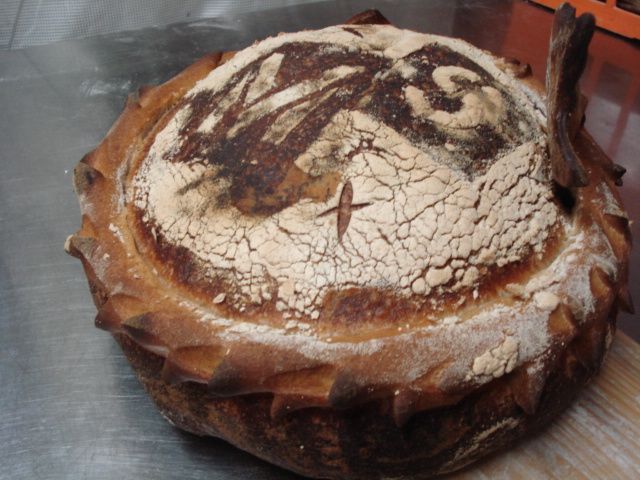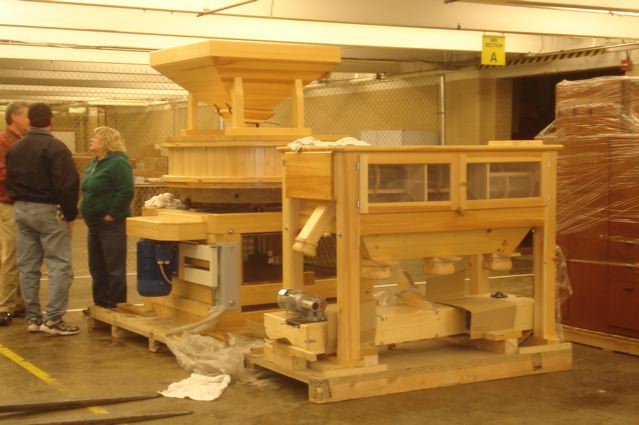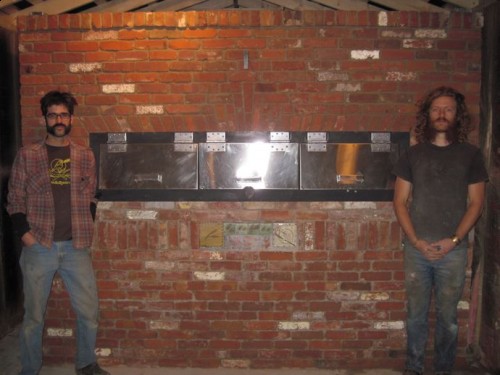After a two-and-a-half-month hiatus, Farm & Sparrow artisan bread returns to shelves this Friday at Greenlife, Grove Corner Market, Earth Fare, and the French Broad Food Co-op. Work on the bakery’s new oven is complete and it is holding temperature well, says baker Dave Bauer.
“We will in fact be baking this Friday,” he wrote earlier this week, after successfully testing the oven.
Anyone who’s tried a loaf of Farm & Sparrow bread knows well the heavy crust. But it’s also the bread’s chewy inner texture and full flavor that make it unique. These come from the ingredients and the way the bread rises: at a low temperature (typically 55-65 degrees), rather than the usual 80-90 degree fast rise.

“We ferment our breads for approximately 18 hours at a cool temperature before baking them in a very hot brick oven. This process balances the flavors of fresh flour and fermentation with the carmelized crustiness that the oven produces,” says Bauer.
The brick oven that Bauer uses is of a new design, which has a story of its own. But it’s a story firmly rooted in an earlier design developed by Alan Scott, who passed away a year ago. “Alan was a pioneering oven builder and designer,” explains Jennifer Lapidus, who, before Bauer, introduced slow-rise, fresh-milled, wood-fired bread to WNC customers, under the trade name “Natural Bridge Bakery.”
To give proper credit, we should note that before Lapidus, Ashevilleans benefited from Chris and Margaret Kobler of Blue Moon Bakery, who introduced authentic French bread using traditional low-temperature proofing, similar to the approach of both Bauer and Lapidus.
Lapidus learned baking from Scott. “I apprenticed under Alan Scott 16 years ago at his then-home in Marin County, Calif. Alan was my teacher of bread, and a dear friend. But beyond my own personal experience with him, his impact on the world of artisan baking should not go unnoticed. Alan was an innovator who brought the concept of wood-fired brick ovens into reality in backyards and bakeries throughout the United States and beyond. Today, Alan’s ovens can be found all over the world.”
There several Alan Scott-built or inspired ovens in Western North Carolina, Lapidus notes. “I am pretty sure Mark Rosenstein has an Alan Scott oven in his backyard; Steve Bardwell and Gail Lundsford of Wake Robin Breads have an Alan Scott oven; Bridge Street Cafe in Hot Springs have an Alan oven; I think Flat Rock Village Bakery’s oven is an Alan design; Andy and Cathy Bennett of Doubletree Farm in Madison County built one of Alan’s ovens into the kitchen of their farmhouse; Bob Bowles (Slow Food Asheville) has an Alan oven in his backyard — that’s off the top of my head.”
The publication of The Bread Builders (Chelsea Green Publishing Co.) in 1999, coauthored by Alan and Daniel Wing, fed the flames of a growing movement in artisan baking. Alan stayed busy traveling and building ovens.
Lapidus explains: “Scott eventually moved to his ancestral homeland in Oatlands, Tasmania, where he pursued his passion for real bread. Although coping with congestive heart failure, he began the process of setting up a grain-milling operation. He was going to get the farmers in Tasmania to plant hard wheat. He called and told me about the farmers who would be growing wheat for the bakeries in Tasmania that use his ovens. In an e-mail he told me, ‘I went ahead and ordered a giant mill from Austria. It’s hand-made by an old couple and just beautiful.’ It had a 48” stone with a capacity of a couple of tons of flour a day.”
Sadly, Alan’s milling operation never got launched. He died of congestive heart failure as his mill was held up by the Australian customs office.
Today, Lapidus is the project coordinator of the N.C. Organic Bread Flour Project, with the goal of linking farmers, bakers, and millers in North Carolina. The project is part of the Carolina Farm Stewardship Association and funded by the N.C. Tobacco Trust.
After Alan’s passing, Lapidus says, “I received a call from his daughter Lila, who said she felt our project should use his mill. And so, after months of meetings and e-mails and research, on Jan. 20, the mill finally arrived here in Asheville.”

The mill sits in a 16,000 square-foot warehouse that is soon to be the production facility of Annie’s Naturally Bakery. The warehouse is centrally located in Asheville, which Lapidus says “is great for all the bakeries whose locations encircle Asheville. The plan is to be able to start working with the mill in March, but just on a testing level — trying different grains, doing bake tests. Pending funding, I intend to have a milling specialist come out from Kansas in late May/early June to help us with the logistical end of things: mill-flow, equipment needs etc.”
Lapidus aims to create a geographically distinct organic bread flour. She explains: “We have gathered a pilot group of seven bakeries in the Western North Carolina region — Annie’s Naturally Bakery, Farm & Sparrow, Wake Robin Breads, Flat Rock Village Bakery, Wildflour, Westend and Loafchild — to form a buyers’ collective that can work directly with North Carolina grain growers, and we have begun to lay the groundwork for a micro-milling facility devoted to North Carolina grains. The idea of placing a mill amongst a high concentration of bakeries, is that we can bring in grain from other parts of North Carolina and provide proper storage, but the flour will be milled fresh and distributed directly to the bakeries, resulting in a high quality product that will carry the discernable signature taste of ‘local.’”
From one generation to the next
“It’s Alan who brought Dave Bauer and me together,” Lapidus recounts. “I called Alan and asked if he knew of a baker who might want to share my space, to enable me to slowly transition out of baking. Dave used to work at a folk center, kind of like John C. Campbell in Western North Carolina, up in Northern Minnesota, where Alan would annually come and teach oven building.”
“Dave is 11 years younger than me and came into baking at a different time, when this stuff was already pretty widespread,” says Lapidus. “He is part of a wood-fired oven listserve that is, to my understanding, this whole community of wood-fired oven folks who discuss this stuff and have taken what Alan did and expanded upon it.
“My bakery was sort of always a work in progress — from a little 3 x 5 foot oven in Tennessee made of mostly red brick (built in 1994), to the 4 x 6 foot outdoor oven in Walnut (built in 1998) that embraced Alan’s evolving plans that came to include high-temp cement and a chamber made of all fire brick, to my final oven, built in 2002, which was built into the bakery and spans 7.5 feet deep to 5 feet across and embraced a number of different insulating materials… Dave’s oven is off the charts — it’s 6 x 10 feet, with a triple-wide door system — in a way, it’s like this wonderful product of his generation.”
Bauer puts it this way: “My oven is same concept as Alan’s, retained heat oven, but with more refinement, and structural reinforcement. I’ve stepped things up in oven-design.” He describes his oven as a next-generation oven.

—Farm & Sparrow’s new oven, with baker Dave Bauer and mason Antoine Guerlain
Farm & Sparrow’s new oven was designed and drawn by William Davenport of Turtle Rock Masonry and built by Antoine Guerlain, a former Asheville native . It emphasizes more mass and more structural reinforcement, Bauer says. It has more arches, more layers of bricks. And some new materials: “I wasn’t happy with the amount of fuel Alan’s ovens needed. So we use a different material, cellular glass, a green insulation product. We’ve added more insulation than was common,” Bauer says.
“I met Alan eight years ago while working at a craft school in Northern Minnesota,” Bauer explains. “I had just finished helping a farmer in Wisconsin build one of his ovens and was focused on learning the craft. I served as Alan’s assistant on six ovens over the next three years.
“He opened the door for me, like many others, to the possibility of creating a small honest livelihood by baking handmade, whole grain bread from a wood-fired oven. He also introduced me to the merits of having grains milled into flour as freshly as possible.
“It was Alan’s idea that a small baker serving a community of people was essential if people were to reclaim there lives from a century of industrial economics. The most important lesson was to get lots of people involved. Though I keep the bread production mainly to myself, I try to integrate as many people into the daily functions of the bakery as possible through a wide network of bartered skills and custom projects.
“It was through Alan that I was introduced to Jennifer Lapidus who invited me to Asheville to begin baking out of her oven.”
“Our breads are naturally leavened with wheat and rye cultures that were passed down to me from an older baker. They are over 90 years old right now. Our flour is milled from heirloom Turkey Wheat, a Russian wheat that gave birth to the early American wheats.
The bakery has been fortunate for all the support received in Asheville,” Bauer says. “I think what people like about the bread, aside from, say its taste or its texture, is that there is a baker who is married to it. I bake the way I do because that is the bread I want to eat.”
There are a lot of others in the Asheville area who do too, so his bread is not likely to stay on the shelves long.
For more on the arrival of Alan Scott’s mill in Asheville, see http://www.mountainx.com/ae/2007/artisan_bread_lovers_alert_alan_scotts_mill_has_arrived_in_wnc/
For more on hard wheat and Jennifer Lapidus’ project to promote it being grown in North Carolina, see http://www.mountainx.com/blogwire/a_passion_for_hard-wheat_flour_one_wnc_womans_milling_story/
And for an article about Natural Bridge Bakery, see http://www.mountainx.com/ae/2007/0329bread.php/




WORTH. EVERY. PENNY.
easily the best bread in asheville.
I’ve been in withdrawal of Dave’s croissant since mid November. Finally, today I got my fix…..his croissant are the best I’ve ever had. I’ve tried them all over town, nothing comes close.
Had Dave over for dinner a few weeks ago, and got to talk to him a little about his oven etc. He’s definitely an exceptionally knowledgeable, talented bread maker and we are very lucky to have him.
I agree that his croissants are particularly sublime. My wife used to drive into the Saturday market in the morning, just to get us a couple before they sold out. Now that he is based close to us in Candler, we are hoping to get special access :^)
Those of us in Asheville are very, very lucky to have a baker of this stature baking for us.
It is exceptional that at his age he has already learned to create breads which rival the best breads from Germany and France.
My visiting relatives from California and Charlotte have been asking about when he will be baking again! All we have to do is drive down to the corner store…